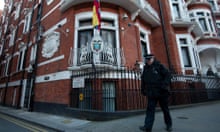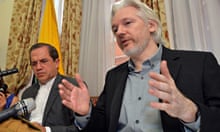How does a wanted man have a book party? On Wednesday night at Babycastles, a Manhattan videogame-art collective, Julian Assange celebrated the publication of his new book, When Google Met WikiLeaks. He was present via videochat. The collectivists projected him on their walls. A crowd had formed to see the shining-haired hacker king – youngish New Yorkers, mostly. They stood or sat and drank beers as Assange talked about the internet.
Assange said: “Compare the mission statements of Google and the NSA – the NSA, who literally say, ‘We want to collect all private information, pool it, store it, sort it, index it, and exploit it.’ Whereas Google says, ‘We want to collect all private information, pool it, store it, sort it, and sell those profiles to advertisers.’ Really, they’re almost identical.”
He said, “Every time you go to a party and take a picture and post that picture to Facebook, you’re being a rat. You’re being a narc.”
Assange now wears a beard. It fuzzed as the feed wavered.
“People who use Google are the product,” he said.
Assange has not left the Ecuadorean embassy in London since August 2012. Meanwhile, he is cursed by statesmen, acclaimed by radicals, and copied by anarchists all over. “Thank God for prison!” the hero of Aleksandr Solzenhitsyn’s In the First Circle thinks. “It gave me the chance to think.” Assange, at least, has been writing.
When Google Met WikiLeaks tells the story of his “secret” meeting in 2011 with Eric Schmidt, the executive chairman of Google. It is presented as a summit of equals – futurology as practiced by two prophets. But in an interview a day earlier, Schmidt had called Assange “very paranoid”.
Assange said: “Schmidt is actually quite similar to me – a smart guy, a very smart guy, who grasps structures and systems quickly. Only he’s very banal. He lacks language. He doesn’t have the capacity for a nuanced understanding of geopolitics.”

Assange said, “It really wasn’t personal, until yesterday.”
He drew up an image of Schmidt’s new book. It is called How Google Works. The cover is like Assange’s cover – a mock Google homepage. On Assange’s, “I’m feeling evil” replaces “I’m feeling lucky.”
Assange said, “Mine was leaked long before his came out. Could it be a happy coincidence?”
Assange spoke of revolving doors and unkept promises. He lamented the “standardization of human behavior” imposed by Google. He attacked its “playroom logos and curved fonts”, the kiddie aesthetic overlaying the corporate agenda. Assange seemed offended by the unadultness of it all. “Only these banal tech reporters will write anything about it,” he said. “No one understood nuclear weapons either, at first, but like the internet they shaped geopolitics.”
Assange spoke to an audience that believed him.
“Google never collaborated with the NSA,” Schmidt said on Tuesday in response to Assange’s claims. “In fact, we’ve fought very hard against what they did.”
At Babycastles, Assange worried only about being “boring.” Twenty minutes in, the camera pulled back to reveal MIA. The provocateur and pop star sat alongside Assange and expressed her hope for his imminent freedom. Assange quotes her lyrics in his book – “Armbone connects to the handbone / Handbone connects to the internet” – a mantra for the new paranoia. MIA explained, “I was out living near burning man. Eric Schmidt must have had a bad LSD trip and I tuned into it.”
Then MIA wandered off. Assange skipped over his own troubles – the allegations of rape, the memoirs of the disaffected. He took questions and subverted their premises. What is a greater force for good, corporations or nations? “You’re assuming a difference between the private sector and the state.” Was “paranoia a badge of honor”? The question came from the moderator, Daniel Stuckey of Motherboard. “Well … Schmidt has a difficult job,” Assange said. Was he the only grown-up in the room?
“He’s so punk,” said Liz, a music journalist.
“He’s steampunk,” said Pamela Drew.
Said Nick, a student, of Assange’s plight: “It’s more like Brave New World than 1984. It’s not like these sexy YA dystopias.”
The moderator took a survey – how many Google employees were in the house? No hands. “I’ll offer them a deal,” Assange said. “Twenty percent off, and we’ll mail the book to you in a brown paper bag.” Laughter – but could Assange hear it? His publisher, Colin Robinson, confirmed that Assange was for real.





Comments (…)
Sign in or create your Guardian account to join the discussion